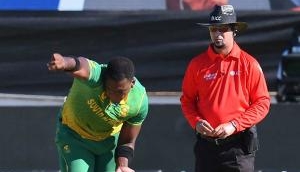
Pushed into a tight corner by the sweeping reforms suggested by the Lodha committee, the Board of Control for Cricket in India (BCCI) suffered yet another blow on 18 July after being given a six-month deadline by the Supreme Court to implement the recommendations.
The two-judge bench, comprising Chief Justice TS Thakur and Justice Ibrahim Kalifullah, upheld majority of the Lodha committee's recommendations - aimed at reforming the administration of the BCCI.
The court made a special mention of 'one state, one vote' policy and the 'age cap' rule among other reforms that are now subjected to be implemented by the Indian cricket board.
Also, no minister or civil servant can be a part of the BCCI and a nominee from the Comptroller and Auditor General (CAG) will also be included in the Board.
The Lodha committee, a three-member panel led by former chief justice of India RM Lodha, had suggested a raft of administrative changes at the BCCI in January this year. But the BCCI challenged those recommendations, including suggestions to delink IPL and BCCI, age restrictions for the board's office bearers and a 'one state, one vote' policy.
As BCCI gears up for an uphill task to implement the Lodha panel's reforms in prescribed time, here's a look at how it is likely to affect the Indian cricket board:
One state, one vote
Court ruling: The recommendation has been accepted.
The Lodha committee recommended that only one association should represent an entire state which will only get one vote. This recommendation, in particular, has been the main argument for the Board and its member associations.
Once implemented, the states of Gujarat and Maharashtra - who have three different full member associations - will find themselves in trouble. The Mumbai Cricket Association (MCA), who will retain the voting right by virtue of being the oldest, will only support this recommendation as long as the three associations in Maharashtra continue to exist.
However, if the same were to apply in Gujarat, where Baroda is the oldest association, the Gujarat Cricket Association (GCA) - headed by BJP president Amit Shah - will lose out on the BCCI voting right. The recommendation will also deny voting rights to Saurashtra Cricket Association (SCA), currently the full member of the Board.
Age cap
Court ruling: The recommendation has been accepted.
Another vexing issue for most associations has been the limiting the tenure of the office-bearers and restricting their age limit to 70 years. The move will undoubtedly rule out a host of current office-bearers.
The recommendation poses a direct threat to SCA president Niranjan Shah. If Lodha committee's recommendation comes into effect, the 71-year-old Shah will be forced to quit. And, that is exactly why the SCA had filed an affidavit against this recommendation in the apex court.
Apart from the SCA, the age cap immediately affects two stalwart administrators - former BCCI presidents Sharad Pawar and N Srinivasan. The 75-years-old Pawar is currently the president of the MCA, while 71-year-old Srinivasan is the undisputed leader of the Tamil Nadu Cricket Association (TNCA).
Similarly, Punjab Cricket Association (PCA) chairman IS Bindra and secretary general MP Pandove (70) will also find it difficult to continue in their respective positions.
Multiple positions in state cricket and BCCI
Court ruling: The recommendation has been accepted.
The Lodha committee also aims to restrict the office-bearers from holding positions simultaneously in both state cricket associations and the BCCI. In simple words, this means that an individual cannot hold a position in the Indian cricket board during his tenure as an office-bearer in the state cricket association or vice-versa.
Its implementation will hamper the role of BCCI secretary Anurag Thakur who is also the president of the Himachal Pradesh Cricket Association (HPCA). The move will also affect BCCI joint secretary Amitabh Chaudhary (President of Jharkhand State Cricket Association) and BCCI treasurer Aniruddh Chaudhary (Haryana Cricket Association secretary).
The recommendation will force the above listed BCCI office-bearers to relinquish at least one of the two posts.
Betting and RTI
Court ruling: The recommendation has been left to the discretion of the Parliament.
The Lodha panel had voiced its opinion to legalise betting in India to curb the menace of match-fixing.
"We have suggested to the legislature for legalising betting with in-built mechanism and ensuring that players, match officials, administrator and team officials will not be entitled to indulge in betting," Justice (Retd) RM Lodha, who headed the panel, said.
The Lodha committee's suggestion has been hailed by cricket administrators and lawmakers alike. If acted upon, the move will not only help in curbing corruption but it will also allow the government to earn revenues to the tune of a staggering Rs 10,000-12,000 crore (assuming 30% rate taxation on earnings).
The panel had also backed the idea of bringing the BCCI under the ambit of the Right to Information (RTI) Act to maintain transparency in the functioning of the Board. But, similar to betting, the Supreme Court has also left this recommendation for the Parliament to decide.
Inclusion of CAG representative
Court ruling: The recommendation has been accepted.
In a bid to revamp the existing BCCI Governing Council (GC), the three-member Lodha panel had proposed a nine-member council comprising two ex-officio members (secretary and treasurer), two members nominated or elected by full members, two nominees of IPL franchises, two from proposed players' associations and one from the Comptroller and Auditor General's (CAG) office.
The presence of a CAG member in the BCCI GC was stressed upon by the apex court that was unhappy with the unequal distribution of funds to different state bodies. The court had earlier said that funds are distributed like "mutually beneficial society" without any rationale.
BCCI had earlier submitted a list of contribution given to state cricket bodies, of which 11 associations didn't get anything. The SC also questioned why cricket board belonging to North East India are given peanuts compared to other states.
Broadcasting and advertising policy
Court ruling: The recommendation has not been accepted.
It is the only silver lining for the BCCI in the 18 July verdict. The court has allowed the Indian cricket board to govern its existing broadcasting policies and contracts.
The BCCI and its members had taken a strong stance against the Lodha panel's recommendation of removing advertisement breaks between overs during a cricket match. If implemented, it could have pushed down the Board's revenues (Rs 1,266.41 crore in 2014-15) to a third.
The Lodha committee had suggested that all existing contracts for international Test and One-Day matches be revised and new ones ensure that only breaks taken by both teams for drinks, lunch and tea will permit the broadcast to be interrupted with ads - currently an international norm.
First published: 18 July 2016, 4:57 IST







![BJP's Kapil Mishra recreates Shankar Mahadevan’s ‘Breathless’ song to highlight Delhi pollution [WATCH] BJP's Kapil Mishra recreates Shankar Mahadevan’s ‘Breathless’ song to highlight Delhi pollution [WATCH]](https://images.catchnews.com/upload/2022/11/03/kapil-mishra_240884_300x172.png)

![Anupam Kher shares pictures of his toned body on 67th birthday [MUST SEE] Anupam Kher shares pictures of his toned body on 67th birthday [MUST SEE]](https://images.catchnews.com/upload/2022/03/07/Anupam_kher_231145_300x172.jpg)






